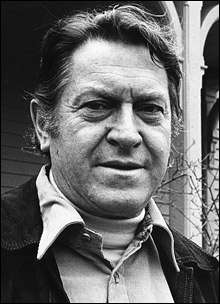Leon Kirchner

Leon Kirchner (January 24, 1919 – September 17, 2009) was an American composer of contemporary classical music. He was a member of the American Academy of Arts and Letters and the American Academy of Arts and Sciences, and he won a Pulitzer Prize for his String Quartet No. 3.[1][2][3]
Life and career
Kirchner was born in Brooklyn, New York. He began his music studies at the age of four. Five years later, his family moved to Los Angeles. He began composing while a student at Los Angeles City College. With the encouragement of his piano teachers and Ernst Toch, he entered the University of California, Los Angeles to study with Arnold Schoenberg.[4] Kirchner began graduate studies at the University of California, Berkeley and was awarded the George Ladd Prix de Paris in 1942. As World War II put Europe in turmoil, he went to New York and studied with Roger Sessions. At the war's end, he returned to Berkeley as a lecturer and assisted Sessions and Ernest Bloch in theory.
Kirchner held a Slee Professiorship at the University of Buffalo (succeeding Aaron Copland), and professorships at the University of California, University of Southern California, Yale University, the Juilliard School of Music, and Mills College, where he was the first Luther Brusie Marchant Professor from 1954 to 1961. In 1961 he succeeded Walter Piston at Harvard University, where he was named Walter Bigelow Rosen Professor of Music in 1965 and taught until 1989.[1] [2] He won the annual Pulitzer Prize for Music in 1967 for Quartet No. 3.[3]
Kirchner's musical style is generally linear, chromatic, rhapsodic and rhythmically irregular; it is influenced by Schoenberg but does not employ the twelve-tone technique. Many of his early works are sectional, with strongly contrasting textures and tempos. In his later works, the textures and tempos tend to be more continuous and changes more gradual. By and large, Kirchner favored compact structures based on a minimal number of motifs. According to Alexander Ringer, he remained consistently individual, unimpressed by changing fashion where "idea, the precious ore of art, is lost in the jungle of graphs, prepared tapes, feedbacks and cold stylistic minutiae".[5]
Kirchner married Gertrude Schoenberg, a singer, on July 8, 1949; they had one son and one daughter.[6] He died of congestive heart failure at his home on Central Park West in New York City. He was 90.
For Kirchner's notable students, See: List of music students by teacher: K to M#Leon Kirchner.
References
- 1 2 CD liner notes of Leon Kirchner The Complete String Quartets, Albany Records, by Boston Composers String Quartet, based on conversations with and materials provided by Leon Kirchner, biographical sketch about the composer by Ellen Schantz.
- 1 2 Biography at Allmusic by Blair Johnston
- 1 2 "Music". The Pulitzer Prizes. Retrieved 2013-11-20.
- ↑ Newlin, Book III, p.243, footnote.
- ↑ Ringer, Alexander L. 2001. "Kirchner, Leon". The New Grove Dictionary of Music and Musicians
- ↑ "Leon Kirchner". NNDB (nndb.com).
- Kennedy, Michael (2006). The Oxford Dictionary of Music. Oxford and New York: Oxford University Press. ISBN 0-19-861459-4.
- Tommasini, Anthony. "Leon Kirchner, Composer and Teacher, Dies at 90" New York Times (September 18, 2009)
- Wakin, Daniel J. "Remembering Leon Kirchner, Who Made Music Heard at Harvard" New York Times. Arts Beat blog (October 13, 2009, 5:43 pm)
- Newlin, Dika. (1980) Schoenberg Remembered: Diaries and Recollections, 1938–1976. New York: Pendragon Press. ISBN 0-918728-14-2.
Further reading
- Ringer, Alexander L. 2001. "Kirchner, Leon". The New Grove Dictionary of Music and Musicians, second edition, edited by Stanley Sadie and John Tyrrell. London: Macmillan Publishers.
- Swart, Inette. 2007. "Leon Kirchner's For the Left Hand: Effective Styles of Writing with Specific Reference to the Use of the Octatonic Scale". Musicus 35, no. 2:110–15.
External links
- Recordings and videos of Leon Kirchner's compositions from the Isabella Stewart Gardner Museum
- Leon Kirchner papers, 1939-2009 Music Division, New York Public Library for the Performing Arts.
- List of compositions from G.Schirmer, Inc.
- Leon Kirchner at Library of Congress Authorities, with 103 catalog records
- Interview with Leon Kirchner by Bruce Duffie, December 16, 1990